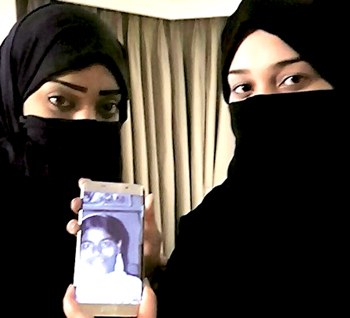Hyderabad, Jan 11: Two sisters from Dubai made an unusual request on Saturday when they called on V Satyanarayana, deputy commissioner of Hyderabad Police’s south zone. Could the police help them find their mother, whom they hadn’t met for 27 years? The only lead they could provide the officer was a faded photograph and an Indian passport, issued in 1981 and barely legible.

Their father Rasheed Obaid Masmary, a Dubai businessman, had married their mother Razia Sayeed in 1981, the marriage arranged by brokers. Rasheed arranged for his bride’s passport, issued by the erstwhile Madras Passport Office, and the couple settled in Dubai.
Ayesha was born a year after the marriage, Fatima the following year. After Rasheed divorced Razia in 1988, allegedly without legal proceedings, the daughters stayed with their father in Dubai. A couple of years later, Rasheed married a second time — the bride was again a Hyderabadi woman — and she settled with him in Dubai.
Ayesha and Fatima never saw their mother since 1988, when they were six and five, too young to remember much about her now. This is their first visit to Hyderabad. Their father never travelled here again although their stepmother would visit home sometimes. Rasheed died a few years ago, apparently without telling his two daughters who or where their mother was.
“Our father had cut off all contact with our mother and never told us anything about her,” said Ayesha. The sisters, fluent in Arabic, are communicating in broken English with people in Hyderabad.
“Except for a photo and a vague, almost illegible handwritten address on her passport, we know nothing about our mother. We don’t even know which part of Hyderabad she was from, or if she has any family here,” Ayesha said. “Our stepmother possibly knows about her but she has refused to tell us anything. We saw some posts on social media about the work done by Hyderabad police in tracing people, so we thought we will try too. Years have passed but we are hopeful we will get to meet her.”
Ayesha, who is married in Dubai, said her businessman husband supported her effort to search for their mother. The sisters flew to Hyderabad last week. They had made calls to police from Dubai earlier but, in the absence of local contacts, they could not make much headway. In Hyderabad, they came in touch with a local activist, Mohammed Abrar Sharif, who took them to the DCP.
The photo has been circulated among police stations. Police said they will try to trace the old address from the passport office in Chennai if those records are still available.






.jpg)
.jpg)
Comments
result of contract marriages as per prefect manual :) hahaha ...pay 2 lakhs , marry 16 year old gal and stay with her for 2-3 months and later escape by giving talakh ... munchene sign bere ...shake bandre shake hand kottu airport nalle welcome maadi karkondu hogi hudugi na kottu madwe maadsi shake baby annistha idranthe howda ... hahahaha .. these saudis exploit innocent women from one particular community and sexcual abuse is very much high .. I have seen many ... papa hudugirna nodidre ayyo papa annisthade ...ummah gang help maadri ...
INSHALLHA......
Allahu Musta'an. Allah knows the best. We all pray for you sister to get your mother soon...
Add new comment